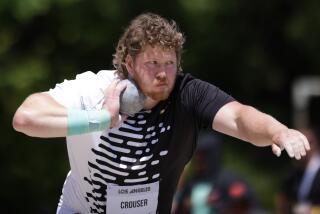TRACK AND FIELD : Asthma Is Joyner-Kersee’s Toughest Foe
The world’s best female athlete walked slowly over, breathing shallowly and coughing. With her right hand, she pinched the bridge of her nose, explaining that she had a headache. Her hand was shaking slightly.
This was the condition of Jackie Joyner-Kersee after only three events in a mini-heptathlon competition last month. This was the condition of the reigning gold medalist in her specialty. She is the world record-holder in the seven-event heptathlon. She is an athlete accustomed to grueling, two-day competitions.
This day should not have been particularly taxing. The weather was warm, with a cool breeze. But Joyner-Kersee was not feeling well and she certainly was not looking well. The problem was, and is, asthma.
Joyner-Kersee’s asthma gives her serious problems--she has recently been hospitalized twice. As an athlete, the condition makes her especially vulnerable. By definition, Joyner-Kersee, as a world-class heptathlete, often puts herself in a position of taxing her cardiovascular system. She breathes hard a lot of the time.
This is not the condition a top-notch athlete would choose. The problem is made worse by three factors:
--Drug testing. The very best drugs available to help Joyner-Kersee all contain substances that are banned by the International Olympic Committee. Most are stimulants. So Joyner-Kersee, who is also subject to random testing by the U.S. track federation, can’t take those drugs. And the drugs she can safely take for her asthma all tend to make her slow, sleepy and uncoordinated.
--Lifestyle. She travels constantly, especially in non-Olympic years. Joyner-Kersee added to her resume the title of successful corporate representative as well as public speaker and charity fund-raiser. She is sought after. Thus, Joyner-Kersee is placing herself in ever-changing environments, temperatures and even air quality. All of this may exacerbate the problem. If she’s in snowy Chicago one week and steamy Florida the next, she can expect to get sick and have an asthma attack. When she does come home to Southern California, she is training in an environment so adverse that it sometimes brings on asthma in otherwise unaffected people.
--Stubbornness. Joyner-Kersee is very, very stubborn. She would like to think that she can face this condition as she would an opponent and beat it, humiliate and conquer it. The fact this is not going to happen is not a reality that Joyner-Kersee is ready to accept.
“It’s frustrating,” she said. “I can control so much of what I do and I can’t control this asthma. Sometimes, I don’t want to accept that I have asthma.”
Joyner-Kersee also has allergies, which trigger her asthma attacks. Asked what she was allergic to, Joyner-Kersee laughed and began briskly counting on her fingers. “Let’s start with grass, something I’m around all the time when I train,” she said. “When they mow the grass at UCLA, I go crazy. I used to wear a surgical mask then (while training), and that helped a bit. But then people started to look at me like I was a crazy woman. OK, there’s peanuts, almonds, peaches, plums, all pitted fruits. Except that I eat those anyway. Pollen, seafood.”
Anyone who has ever had or witnessed an asthma attack knows how frightening it can be. The throat constricts, and the victim can’t breathe. Panic sets in, followed by panting and resultant loss of breathing control, exactly the wrong thing.
Joyner-Kersee’s last serious attack came in March. Her husband, Bobby Kersee, found her doubled over, gasping for breath. She refused to go to the hospital. It took Kersee and Jackie’s brother, Al Joyner, to load her into the car and speed her to an emergency room. When they got there, she didn’t want to go in, insisting that she could get her breathing under control.
“Al and I looked at each other and just picked her up and carried her through the door,” Kersee said.
She was hospitalized for two days.
With the National Championships coming up next week in New York, Joyner-Kersee is naturally concerned about keeping her asthma under control. Most of the time it is, but it seems to her that lately, when it flares up, it is worse than before. All of which might affect her competition, both at the nationals and at the World Championships in Tokyo in August.
Kersee, who is also her coach, said he would like her to score about 7,000 points in the heptathlon next week. Her world record is 7,291.
The difference this season, he said, is with her. “I don’t have to push Jackie,” Kersee said. “This year, I’m pulling her. She wants to do more this season. Last year was a different story. Last year she knew she was just going to compete in ’91 and ‘92, so it was hard to get started. She was competing, but at the same time she was taking a mental break. Realistically, she was tired. There was a lot of travel. Her asthma was triggered more by mental stress.”
By Kersee’s count, his wife was away from home 284 days in 1990.
“I let her call her own shots last year, make her own plans,” Kersee said. “But this year she’s mine. I’ve told her, through May of this year she can do what she wants. As of June, I’m taking over.”
Despite their bargain, Joyner-Kersee couldn’t miss the opportunity to disobey--she’s going to New York a few days early next week so she can attend an awards dinner.
“She snuck that one in,” Kersee said, laughing.
More to Read
Go beyond the scoreboard
Get the latest on L.A.'s teams in the daily Sports Report newsletter.
You may occasionally receive promotional content from the Los Angeles Times.








